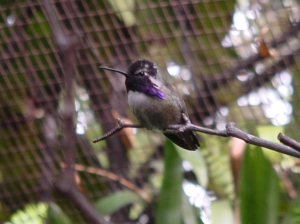this might be the perfect season to display Emily Dickinson’s talents as a nature poet—for which she is not often overtly credited. She seems at times to have required of herself a very particular scrutiny of the natural world outside her bedroom window—which allowed her to identify what she was watching, without ever naming it. And since, of course, none of her poems have titles, there are no clues to be found there either.
So the three poems I am offering are, therefore, riddles. Because we can see what she herself saw, you will have to attend to the evidence as she presents it, and arrive by inductive steps at your own recognition. The first one is easy (or should be):
311
It sifts from Leaden Sieves—
It powders all the Wood.
It fills with Alabaster Wool
The Wrinkles of the Road—
It makes an Even Face
Of Mountain, and of Plain—
Unbroken Forehead from the East
Unto the East again—
It reaches to the Fence—
It wraps it Rail by Rail—
Till it is lost in Fleeces—
It deals Celestial Vail
To Stump, and Stack—and Stem—
A Summer’s empty Room—
Acres of Joints, where Harvests were,
Recordless, but for them—
It Ruffles Wrists of Posts
As Ankles of a Queen—
Then stills its Artisans—like Ghosts–
Denying they have been—
Here an equally glorious mystery:
1068
Further in Summer than the Birds
Pathetic from the Grass
A minor Nation celebrates
Its unobtrusive Mass.
No Ordinance be seen
So gradual the Grace
A pensive Custom it becomes
Enlarging Loneliness.
Antiquest felt at Noon
When August burning low
Arise this spectral Canticle
Repost to typify
Remit as yet no Grace
No Furrow on the Glow
Yet a Druidic Difference
Enhances Nature now
This third poem deals with a force of nature that is not, strictly speaking, natural:
585
I like to see it lap the Miles—
And lick the Valleys up—
And stop to feed itself at Tanks—
And then—prodigious step
Around a Pile of Mountains—
And supercilious peer
In Shanties—by the side of Roads—
And then a Quarry pare
To fit its Ribs
And crawl between
Complaining all the while
In horrid—hooting stanza—
Then chase itself down Hill—
And neigh like Boanerges—
Then—punctual as a Star—
Stop—docile and omnipotent
At its own stable door—
Oh, well, okay, one more—which I will dedicate to Evelyn Ida:
214
I taste a Liquor never brewed—
From Tankards scooped in Pearl—
Not all the Vats upon the Rhine
Yield such an Alcohol!
Inebriate of Air—am I—
And Debauchee of Dew—
Reeling—thro endless summer days—
From inns of Molten Blue—
When “Landlords” turn the drunken Bee
Out of the Foxglove’s door—
When Butterflies—renounce their “drams”—
I shall but drink the more!
Till Seraphs swing their snowy Hats—
And Saints—to windows run—
To see the little Tippler
Leaning against the—Sun—

